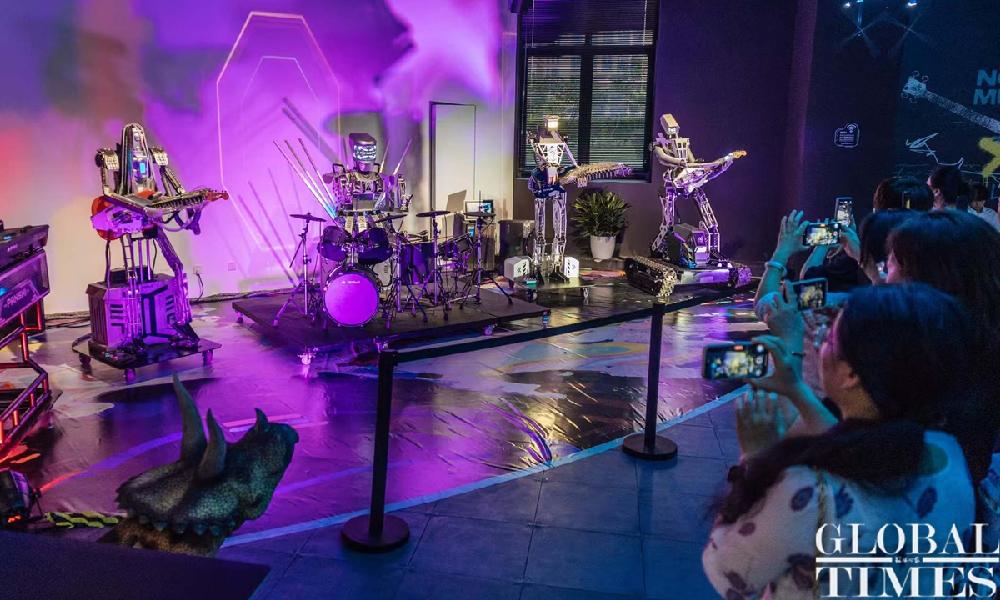
The world's first 4S store for humanoid robots — Robot Mall — opens in Beijing's Yizhuang on Friday, coinciding with the start of the 2025 World Robot Conference (WRC). Together with a neighboring robot-themed restaurant, these high-tech venues show that the application of humanoid robots in daily life is just around the corner.
The Global Times on Thursday visited the Robot Mall ahead of the opening of the 2025 WRC. Entering the main hall, a large robotic hand suspended from the ceiling sets the stage for the exhibition area. This hand can move up and down, and its joints articulate like a human hand. On the first floor of the Robot Mall, leading humanoid robots are on display, including Tienkung from the Beijing Humanoid Robot Innovation Center, G1 by Unitree Robotics, and Walker S by UBTECH.
The Robot Mall has a total area of about 4,000 square meters across four floors, showcasing seven major categories and more than 50 robot brands, covering various fields including medical, industrial, bionic, and humanoid robots, the Global Times learned from the store.
On the second floor, visitors can interact with various types of robots, including robot dogs and robot hands, as well as compete with robot athletes in football, basketball and chess. The third floor showcases a one-stop service process for robot part replacement, diagnostics, and remote operation and maintenance, and the fourth floor provides a high-end negotiation space to facilitate precise industry matchmaking and support business cooperation.
Unlike traditional robot dealers, this 4S store offers full-process services — from selection to operation and maintenance — covering display, after-sales services, spare parts and user feedback, helping optimize products and align them with market needs, Meng Yanpei, a representative of the Robot Mall, told the Global Times.
Meng said that the current focus is on refining the service system and business model. The mall has received collaboration invitations from countries such as Germany and Saudi Arabia, as well as from local governments in China, which are hoping replicate the 4S store model, he noted, adding that robot manufacturers worldwide are also seeking opportunities to display their products in the facility.
Next to the Robot Mall stands a robot-themed restaurant, where customers can have a special dining experience with service robots, such as multilingual artificial intelligence-powered robot bartenders, a robot rock band, robot waiters and waitresses, and most impressively - robot cooks.
Sun Ling, a representative of the robot restaurant, told the Global Times that the venue is partly built as a tech testing platform and demonstration base for robot applications, which allows consumers to experience the fusion of technology and dining, while offering research and development companies a space to test their products and collect data in a real-world setting.
Foreign visitors also expressed positive views of the Chinese humanoid industry's development. Benjamin Sovacool, a visiting scholar from Boston University, told the Global Times that the 4S store helps people become more familiar with humanoid robot technology, as he observed that some robots are very good at certain tasks like dentistry or pharmacy, while they lag at some sports such as football.
Francisco Miguel Paulo, an economist from Angola, told the Global Times that humanoid robots can handle tasks that are dangerous for humans, because they don't get sick or infected, and can be easily repaired, while noting that it is important for governments to create policies that define which jobs can be replaced by robots and which ones should remain with humans.
Paulo said that the Robot Mall showcases robots for every kind of sector — medical, cleaning and pharmaceutical — and almost all types of jobs, which allows people to experience and see the potential of robots, and could further benefit companies along the humanoid robot industrial chain.
"The establishment of the world's first 4S store for embodied AI robots marks a key step in building a vibrant robotics industry ecosystem in the Yizhuang area," Liang Liang, a deputy director of Yizhuang's administrative committee, said in a previous press briefing. "It paves the way for the rapid development of robotics firms and enhances Yizhuang's global influence as a robotics hub."
Yizhuang, or E-Town, has become a major cluster for robotics and smart manufacturing in China, and is now home to more than 300 enterprises in the sector. The area boasts a robotics industry chain valued at more than 10 billion yuan ($1.39 billion), accounting for half of Beijing's total robotics output, according to the Xinhua News Agency.
In 2024, China accounted for two-thirds of global robot patent applications and produced 556,000 industrial robots, remaining the world's top manufacturer.
